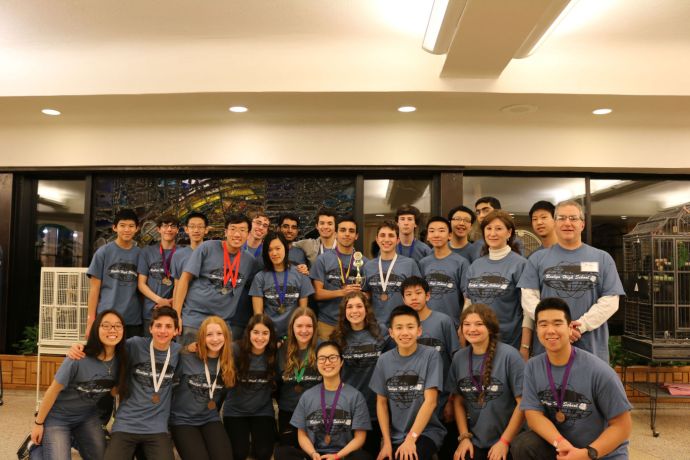The Science Olympiad team at Roslyn High School have won five of the last six regional competitions they’ve competed in, but have always fallen short of advancing to the nationals.
“We mostly win the regional competitions,” Science Olympiad team coach Irena Tsarevsky said.
Tsarevsky and William Marvin, another teacher who coaches the Science Olympiad team, said they acknowledge that winning the regional competitions is a great accomplishment, but they would like to go further
The problem, Tsarevsky said, is the way Roslyn High School is set up.
“We’re more like a club,” Tsarevsky said. “All the other schools we compete against on the state level have Science Olympiad as a class or on their curriculum.”
Marvin said advancing to the state finals in itself is a big accomplishment for the team.
“Our students are in a lot of things and they want to do well in a lot of things,” Marvin said.
As an example, he said, one of the members of the team, sophomore Dean Oken, is a member of the national honors society, the marching band, the mathematics team and the science olympiad team.
He is also enrolled in Multi-variable Calculus, which Marvin said, perhaps is the hardest course in the school as well as a gymnasium class, Physics C, AP Economics, AP Spanish and AP History.
“Those are the kinds of students we have here,” Marvin said. “To ask more of them is just impossible.”
Oken said there are members of the team who leave the once a week practice workshop because they have track or another sport.
“There are kids in the school who should be a part of the club who aren’t because they have other commitments,” he said.
Tsarevsky, Marvin, and Oken said another reason the team doesn’t do well at the state finals is it has less opportunity to prepare.
“All these other schools have the science olympiad as a class or workshop and we don’t,” Tsarevsky said.
At the Science Olympiad Championships, students attend events without any prior knowledge of what they will be building.
Marvin said the judges instruct students to build a car that is remotely operated on a nine- to 12-meter long track.
“You have to build a model bridge with a high efficiency to determine how much mass it holds,” Marvin said. “If it can’t hold enough mass or it falls, you have to rebuild it.”
Students also build a plane that is judged by how long it stays in the air.
“The plane can stay up in the air for about two to three minutes,” Marvin said for example.
The planes, he said, have to lift off from the ground, climb to a certain height, stop and not hit the ceiling.
Tsarevsky said the team doesn’t have its own workshop and they often have to work around the basketball and volleyball team’s schedule to use the gym to test-fly planes the students build.
“Those two little things give the best schools an advantage,” Marvin said.
Marvin pointed to the Three Village Central School District team, which advances the National Championships every year.
“I mean what do they have, the Brookhaven National Laboratory,” Marvin said. “Either their parents teach at Stony Brook University or work at Brookhaven.”
Some students on the Olympiad team admit that losing at every state finals is painful but said they deserve some recognition from the school administration and the Board of Education.
“They know about us but we could get more recognition,” Oken said.
Tsarevsky said school administrators know about the team since approval of travel expenses have to go through the board, but he thinks they may not appreciate how much commitment her students put into practicing for the competition.
“These students don’t win awards or anything but they take a lot pride in the work they do,” Tsarevsky said.
Anuj Gupta, a junior captain on the team who mostly participates in the biology events, echoed the team’s disappointment in not advancing past the state finals but emphasized the benefits of the club.
“If you love what you do, it’s up to you to create the best model or design that will win first place,” Gupta said.
He said the club fosters creativity and competitive intellect since his teammates aren’t rewarded with a grade but they get to show off their work to their peers.
To get on any of the teams, students take a variety of test designed to test individual strengths in subjects like biology, physics and engineering.
The students are then divided into two teams — A and B — based on their test scores.
The two teams, attend the regional competition but only one team is taken to the state finals.
Tsarevsky said two teams were created to leave room for competition and as back up in case someone drops out of the ‘A’ team.
The team returned from Syracuse on March 13 having fallen short of advancing to the nationals for the fourth year in a row.
“We didn’t qualify for nationals but we did win medals in two events,” said Marvin, who also teaches engineering at Roslyn High School.
Oken and Melanie Landesburg won a medal for ‘Wright Stuff,’ a construction event.
Marvin said their rubber band powered a plane that stayed in the air for up to 81 seconds.
Parker Miller and Jefferey Yu also won a medal for remote sensing.
“These are the cream of the crop and they are the top students that despite of their busy schedule, there is something inside of them that makes them do it every year,” Marvin said.

